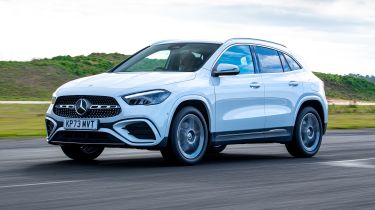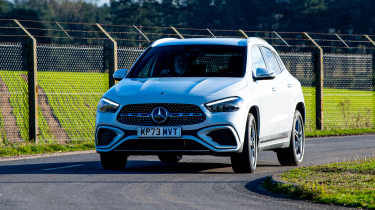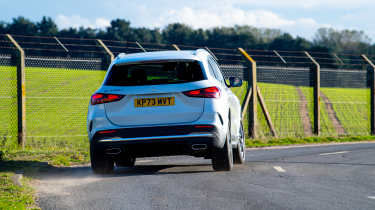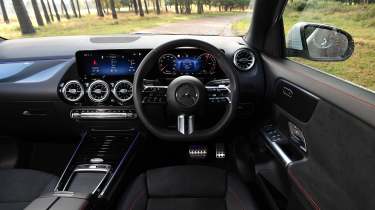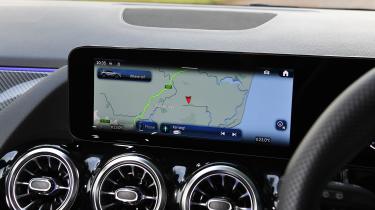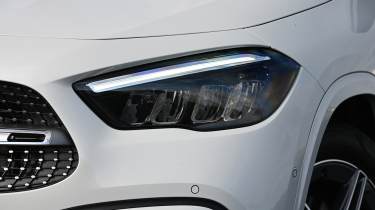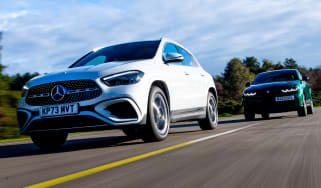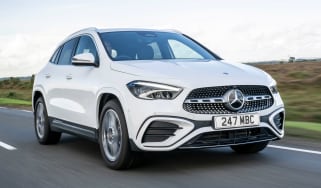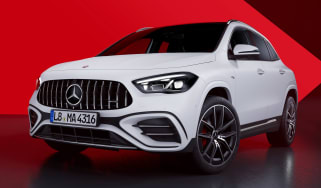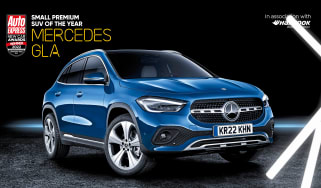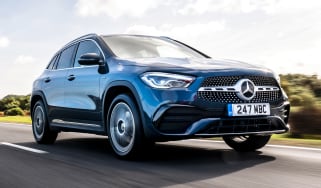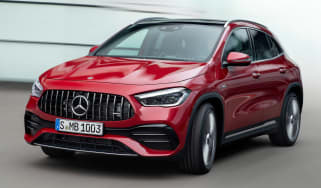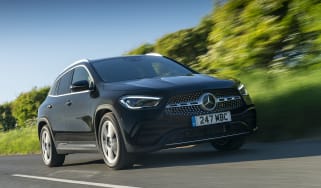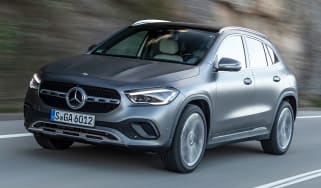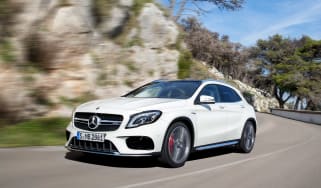Mercedes GLA review
The Mercedes GLA is a premium compact SUV offering high levels of comfort and refinement, and good on-board tech

Our opinion on the Mercedes GLA
A three-time winner of our Small Premium SUV of the Year award not too long ago, the Mercedes GLA is comfortable and practical, plus it’s offered with a wide variety of engine options. The modestly powered petrol and diesel versions are fairly frugal and priced competitively, while the plug-in hybrid GLA 250 e with its 45-mile EV range is ideal for company car drivers. There are also two fire-breathing AMG versions.
However, the current second-generation GLA is considerably older than its key rivals from BMW and Audi, and there’s an all-new model coming in 2026 that’ll feature the brand’s latest, cutting-edge hybrid and EV powertrains. So if you want a small, premium SUV from Mercedes, we suggest holding off until next year.
About the Mercedes GLA
The current, second-generation Mercedes GLA was launched in 2020, with an electric version called the Mercedes EQA introduced in 2021, then the pair were updated in 2023. However, we should highlight that an all-new, third-generation GLA has already been spotted testing and is due to arrive before the end of 2026. It will feature the same hybrid and EV technology as the new Mercedes CLA saloon that just been launched.
If you can’t wait that long, the current GLA is available in five trim levels: Sport Edition, Sport Executive, AMG Line Executive, AMG Line Premium and AMG Line Premium Plus - and with a choice of petrol, diesel and plug-in hybrid engines. There are also three trim levels of the tuned AMG version with up to 416bhp on tap, plus the EQA with its own selection of trims and up to 320 miles of range.
Mercedes GLA prices and latest deals
Prices for the Mercedes GLA start from more than £36,000 - slightly less than the BMW X1, and nearly £3,000 less than the latest Audi Q3. However, the price tag quickly rises past the £40k mark if you upgrade to a higher specification or a more powerful engine. You’ll have to pay more than £45k to get the plug-in hybrid GLA 250 e, for instance, meanwhile the EQA starts from nearly £50k.
Used - available now

2022 Vauxhall
Corsa Electric
26,110 milesAutomaticElectric
Cash £11,000
2022 Volkswagen
T-Roc
16,360 milesAutomaticPetrol1.5L
Cash £19,000
2021 Mercedes
A-Class Saloon
52,694 milesAutomaticPetrol1.3L
Cash £15,987
2018 Volkswagen
Up
47,019 milesManualPetrol1.0L
Cash £6,910Thankfully, you can get up to £2,000 off the price of a brand new GLA by ordering it through the Auto Express Buy A Car service, including models that are already in stock at dealers across the UK. Or there are nearly 200 used examples to choose from, with prices starting from as little as £8,500.
Performance & driving experience
Pros |
|
Cons |
|
Mercedes has ensured that the GLA delivers premium levels of comfort and refinement. The SUV’s extra ride height and additional suspension travel compared with the A-Class hatchback, which uses the same platform, mean that it soaks up road imperfections easily and offers a comfortable drive.
The inevitable trade-off is that the GLA isn’t the most engaging steer, although if you fancy your compact SUV with a bit more shove, that’s exactly what the Mercedes-AMG models are for.
The GLA employs the second generation of Mercedes’ Modular Front-wheel-drive Architecture (MFA2 platform), which is also able to incorporate the manufacturer’s 4Matic four-wheel-drive system. This can send 50 per cent of the engine’s power to the rear wheels for extra grip, if needed.
| Model | Power | 0-62mph | Top speed |
| Mercedes GLA 180 | 134bhp | 10 seconds | 124mph |
| Mercedes GLA 200 | 161bhp | 8.9 seconds | 130mph |
| Mercedes GLA 200 d | 148bhp | 8.8 seconds | 129mph |
| Mercedes GLA 220 d 4Matic | 188bhp | 7.5 seconds | 136mph |
| Mercedes GLA 250 e | 215bhp | 7.9 seconds | 130mph |
Performance, 0-60mph acceleration and top speed
The GLA 180 and 200 both feature a 1.3-litre four-cylinder petrol linked to a 48-volt mild-hybrid system, providing an extra 14bhp for brief moments and allowing for engine-off coasting. Meanwhile, the diesel GLA 200 d and 220 d have 2.0-litre, turbocharged four-cylinder engines under the bonnet.
When we tested the GLA 220 d 4Matic we found it pulled strongly, with maximum torque achieved from just 1,600rpm. The eight-speed automatic transmission that every GLA uses works well, and it doesn’t hold onto revs too long before changing gear.
If you want performance and superior economy, that’s exactly what the GLA 250 e provides. It also uses a 1.3-litre petrol engine, but it’s assisted by a more powerful electric motor. Combined, these deliver 215bhp, which is more than enough punch to get up to motorway speeds, even when in fully electric mode. The petrol engine can lend a hand if you’re really in a rush, though.
Mercedes hasn’t forgotten those who desire plenty of pace, so at the top of the GLA range sits the Mercedes-AMG GLA 35 with 302bhp and the extreme 415bhp GLA 45 S, both of which use the same turbocharged 2.0-litre four-cylinder engine with power going to all four wheels through an eight-speed automatic transmission. The 35 gets from 0-62mph in 5.2 seconds and has a top speed of 155mph, while the extra power of the 45 S has a Volkswagen Golf R-beating 0-62mph time of 4.3 seconds and a 168mph top speed.
Town driving, visibility and parking
The plug-in GLA 250 e can tackle most short journeys into town without ever waking the petrol engine, thanks to up to 45 miles of pure-electric range and its responsive e-motor. When the engine comes to life, it does so smoothly and without much noise. We did find the ride in the PHEV to be on the firm side, but still comfortable.
However, the regenerative braking on mild-hybrid models can be unsettling when transitioning between energy recovery and physical disc and pad engagement, making it difficult to slow down smoothly. We found that this is even more noticeable on the plug-in hybrid model.
Country road driving and handling
The regular GLA isn’t much fun to drive, due in part to a lack of steering feel and a relatively high centre of gravity, which aren’t surprising qualities for a compact SUV. Grip is good, though, so it’s stable and sure-footed around corners. If you want some thrills to spice up the school run, there’s the GLA 35 and 45 from AMG.
Motorway driving and long-distance comfort
The GLA’s ride isn’t as firm or harsh as rivals such as the Alfa Romeo Tonale or BMW X1, and its suspension absorbs bumps well. We felt during our testing that the plug-in GLA 250 e was more settled over larger bumps than the petrol or diesel versions, plus it can be driven in EV mode even at higher speeds, boosting refinement even further. However, there is perhaps a little more road noise inside the GLA than some rivals.
“For private buyers, the petrol GLA 200 will make plenty of sense. The mild-hybrid system is keen to cut out when coasting towards a junction, and the engine fires up smoothly when more power is needed." - Alex Ingram, chief reviewer.
MPG & running costs
Pros |
|
Cons |
|
In 2023, Mercedes added mild-hybrid technology to the regular petrol and diesel versions of the GLA to help boost their efficiency. The petrol GLA 180 and 200 offer up to 43.5mpg on the WLTP combined cycle, and emit up to 155g/km of CO2. We achieved 43mpg when testing the updated Mercedes GLA 200 with mild-hybrid tech, which is almost exactly what Mercedes says it should be able to return.
The diesel GLA 200 d and 220 d perform better than their petrol counterparts in terms of fuel economy, returning up to 52.4mpg, while CO2 emissions reach up to 158g/km.
The BMW X1 is available with a similar selection of petrol and diesel engines, which are slightly more efficient on paper. The base petrol engine, for instance, can return closer to 50mpg, while the diesels can do almost 60mpg.
The hot AMG versions also utilise mild-hybrid tech. However, that doesn’t stop them from drinking through petrol. The GLA 35 returns 32.2mpg at best, while the GLA 45 does just 28mpg.
| Model | MPG | CO2 | Insurance group |
| Mercedes GLA 180 Sport Edition | 42.9mpg | 148g//km | 22E |
| Mercedes GLA 200 d Sport Executive | 52.4mpg | 142g/km | 26E |
| Mercedes GLA 200 AMG Line Premium Plus | 41.6mpg | 155g/km | 27E |
| Mercedes-AMG GLA 45 S 4Matic+ | 28mpg | 229g/km | 42E |
Electric range, battery life and charge time
For those looking to lower their running costs, the GLA 250 e plug-in hybrid model should be at the top of the list. That’s because it can (theoretically) return up to 282.5mpg and offers a pure-electric driving range of up to 45 miles, although that varies slightly depending on the trim level.
However, like with all plug-in hybrids, to achieve such impressive figures you’ll need to ensure you top up the 16kWh battery as often as possible, which requires you plug it in to recharge. That takes about four-and-a-half hours using a typical 7.4kW home wallbox charger.
| Model | Battery size | Range | Insurance group |
| Mercedes GLA 250 e AMG Line Executive | 16kWh | 45 miles | 25E |
Insurance groups
The entry-level GLA 180 Sport Edition falls into insurance group 22, so premiums are going to be on the high side. That said, the entry-level BMW X1 sDrive20i is in group 25. Equally, there’ll be no insurance bargains if you opt for a diesel version, with the base 200 d Sport Executive in group 26 and the GLA 250 e hybrid sitting in group 25.
Tax
The all-electric Mercedes EQA is the best option for company car buyers, because it attracts just three per cent Benefit-in-Kind (BiK) company car tax. However, if you’re not ready to go electric, the next best option is the plug-in hybrid GLA 250 e, because it falls into the 19 per cent BiK band. Meanwhile, even the most basic petrol GLA 180 falls into the 35 per cent tax bracket.
For private buyers, only three versions of the GLA avoid the surcharge for cars costing more than £40,000 when new, which means they’ll incur the luxury car tax. It’s an annual surcharge payable from the second time the vehicle is taxed until it’s six years old.
Depreciation
You’d expect sound residual values from a premium manufacturer such as Mercedes, and according to our latest expert data, the GLA doesn't disappoint. After an average ownership period of three years and 36,000 miles, the GLA should hold onto up to 59 per cent of its original value. The base 180 model is expected to retain the most. The BMW X1 isn’t far off, retaining up to 55 per cent of its value, whereas the latest Audi Q3 is expected to hold onto 40 to 50 per cent over the same period.
To get an accurate valuation on a specific model check out our free car valuation tool...
Interior, design & technology
Pros |
|
Cons |
|
The original GLA didn’t really hit the mark for being the best-looking small SUV, and was missing the crucial sense of style that most Mercedes customers desire. The Mk2 offers much more kerb appeal, with the interior including quality materials and much greater focus on technology, with a dual-screen infotainment system featuring in every model.
Outside of the Mercedes-AMG performance models, customers now have the choice of five core trim levels. Standard equipment on the most entry-level GLA Sport Edition includes 18-inch alloy wheels, LED headlights, heated front seats, keyless go, reversing camera and a 10.25-inch touchscreen with Apple CarPlay and Android Auto connectivity.
That’s not bad. However our pick of the range is AMG Line Executive, because it’s available with a choice of engines and adds:
- AMG styling kit
- 19-inch alloy wheels
- Privacy glass
- AMG sports seats with leather and suede upholstery
- Nappa leather steering wheel
- Wireless smartphone charging pad
- 64-colour ambient lighting
If you feel like opting for Premium or Premium Plus trim levels, these offer luxuries such as 20-inch rims, adaptive dampers, a panoramic sunroof, head-up display, a 360-degree parking camera and more driver-assistance tech.
Interior and dashboard design
The GLA’s dashboard design is virtually identical to the Mercedes A-Class hatchback, including its pair of 10.25-inch displays, a bank of climate controls and a row of three circular air vents. That said, the top of the dashboard is taller in the GLA and it offers a more upright driving position, as one would expect from an SUV.
Materials and build quality
The BMW X1 and Audi Q3 might feature fresher, more modern interiors, but the quality of the GLA’s is still very impressive. There are lots of soft-touch materials - the AMG Line Executive model we drove featured leather and suede on the doors and centre console - plus the metal switchgear is satisfying to use, especially when you hear and feel the click of the rotary controls on those metal air vents. However, it’s very fiddly trying to use the various controls on the steering wheel.
Sat-nav, stereo and infotainment
The GLA’s infotainment system is great. The built-in sat-nav can feature augmented reality if you tick the right box, which means it will overlay directional arrows onto a live picture of the view ahead displayed on the 10.25-inch touchscreen. It’s clever tech, but you have to take your eyes off the road to benefit from it, so it has its strengths and its flaws.
Of course, you can use the standard Android Auto and Apple CarPlay smartphone connection, if you prefer. You’ll have to plug in your phone, but a wireless charging pad is included on AMG Line Executive trim and above, if you don’t use either of these functions.
Otherwise, the graphics on the Mercedes set-up are super-sharp and the touchscreen responds quickly; you can use the touch-sensitive pad on the transmission tunnel, but it’s a bit tricky at times. The menu layout removes a lot of the complexity though, because it’s so simple to navigate.
“The chunky steering wheel is good to hold, but the twin horizontal spokes that are packed with multifunction controls are a bit fiddlier to use than necessary, and need a delicate touch to operate properly. It’s also easy to brush them accidentally when turning the wheel.” - Dean Gibson, senior test editor.
Boot space & practicality
Pros |
|
Cons |
|
Mercedes increased the interior space for the second-generation GLA by making it a full 110mm taller than the original model, and extending the wheelbase by 30mm. Boot space also grew as a result, and it’s still on par with the newer BMW X1 and Audi Q3, plus the Range Rover Evoque.
Dimensions and size
| Model | Mercedes GLA | BMW X1 | Audi Q3 |
| Length | 4,412mm | 4,500mm | 4,531mm |
| Width | 1,834mm | 1,845mm | 1,859mm |
| Height | 1,616mm | 1,642mm | 1,608mm |
| Wheelbase | 2,729mm | 2,692 mm | 2,680mm |
| Boot space | 495 litres | 540 litres | 488-575 litres |
At just over 4.4-metres long, the GLA is smaller than its BMW X1 and Audi Q3 rivals, plus the Volvo XC40, MINI Countryman and Alfa Romeo Tonale. However, that doesn’t stop the Mercedes from offering more boot space than almost all of them, except the BMW and certain versions of the Alfa. It’s also slightly larger than the Range Rover Evoque, and more practical as a result.
Seats & passenger space
Space upfront in the GLA is more than adequate, although rear-seat passengers may find things a bit tighter. Rear legroom is just about okay, and headroom could be an issue for taller individuals, due to a sloping roofline. The rear seat backs do recline though, which may offer some help in getting more comfortable.
When we tested the GLA against the Alfa Tonale, we found the Mercedes’ cabin wasn’t as wide as its rival’s (1,433mm for the GLA versus 1,456mm for the Tonale), which means trying to seat three adults across the back will be more of a squeeze. Plus, while the two outer seats are sculpted - and both feature a set of ISOFIX mounting points for child seats - the middle chair is more of a perch.
Boot space
Petrol-powered versions of the GLA offer up to 485 litres of boot space, while diesel models have 487 litres. However, you can only cram up to 445 litres worth of stuff into the plug-in hybrid 250 e. Again, that’s less than the equivalent BMW X1 or Audi Q3, but we think it should just be enough to accommodate the luggage of a family of four. The GLA boasts a more flexible 40:20:40 split folding rear seat, revealing 1,422 litres of space to play with in the diesel version (1,420 litres in the petrol), or 1,385 litres in the plug-in hybrid.
Reliability & safety
Pros |
|
Cons |
|
Safety is an area where Mercedes customers can feel reassured. The latest GLA went through Euro NCAP’s battery of crash tests in 2021 and came out the other side with the organisation’s maximum five-star safety rating. It was also awarded a very impressive 96 per cent adult occupant protection score, and a 90 per cent score for child occupant protection.
It only got a 75 per cent score in the safety-assist category, but that’s not to say the GLA doesn’t come with any driver-assistance tech. In fact, every model includes lane-keeping assist, Active Brake Assist, cruise control, auto headlights and rain-sensing wipers.
Top-of-the-line AMG Line Premium Plus versions also have adaptive cruise control, blind-spot monitoring, lane-change assist and other ADAS tech as standard, but you can add it to lower-spec models by adding the optional Driving Assistance package for £1,495. Although it is worth noting that less expensive cars and some of the GLA’s rivals such as the Audi Q3 come with this technology as standard.
The Mercedes GLA didn’t make it onto our most recent list of the best cars to own, which is based on the results of our Driver Power owner satisfaction survey. However, the A-Class hatchback (which the GLA is based on) finished in 11th place out of the 50 cars included in the survey, and Mercedes as a brand came second out of 31 brands in our best car manufacturer rankings. Subaru finished first this time around.
Buying and owning
- Best buy: Mercedes GLA 200 AMG Line Executive
For most buyers, the simple mild-hybrid petrol engine will meet their everyday needs. The 161bhp GLA 200 delivers adequate performance and decent fuel efficiency. In AMG Line Executive trim, it’s priced at just over £42,000, so it will incur the luxury car tax supplement, but we think it’s worth paying the extra money for the features you get over lesser Sport Edition and Sport Executive models.
Alternatives
The Mercedes GLA’s biggest and closest rivals are the BMW X1, Audi Q3 and Volvo XC40, because all four are offered with a similar choice of powertrains, feature premium interiors and are similarly practical. There are even all-electric versions of these rivals that compete against the electric Mercedes EQA in the form of the BMW iX1 and Volvo EX40. The Range Rover Evoque is another, if slightly more expensive, alternative, starting from £44k, while the funky MINI Countryman is available from less than £30k. Some left-field options include the Cupra Formentor and Alfa Romeo Tonale.
Mercedes GLA history
Mercedes GLA Mk2: 2020 to present
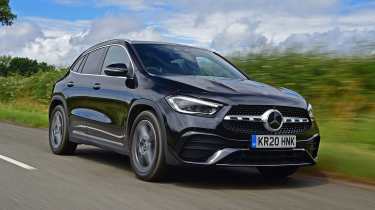
Mercedes has refined the GLA in all the right places. Compared with the original model, it’s more practical, offers advanced driver-assistance tech and is a comfortable place in which to travel. When you add in a strong range of petrol, diesel and plug-in hybrid powertrains, plus powerful AMG versions, along with the improved quality of materials throughout the cabin, the GLA has noticeably come of age. Read our full Mk2 Mercedes GLA buyer's guide here...
Mercedes GLA Mk1: 2013-2020

The first Mercedes GLA SUV was launched in 2014 to a rather modest fanfare. Although it was a supposed premium product, designed to take on the likes of the Audi Q3 and BMW X1, it fell short in a number of key areas. The interior was a little cramped, the ride wasn’t particularly comfortable and the bland styling didn’t inspire a sense of desirability. It was telling that the original GLA design was often referred to as just an ‘A-Class on stilts’. Read our full Mk1 Mercedes GLA buyer’s guide here...
Frequently Asked Questions
An all-new, more advanced Mercedes GLA is just around the corner, but nevertheless, the current Mk2 is still a comfortable and premium-feeling compact SUV with a wide variety of engines to suit almost all customers, and it's practical, too.

